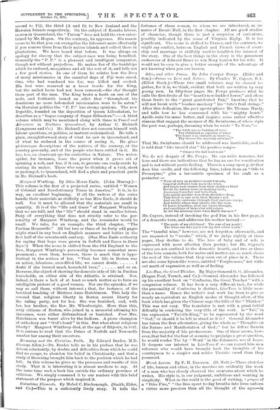Odes, and other Poems. By John Cowper Powys. (Rider and
Son.)—Poems on Love and Nature. By Charles W. Cayzer, B.A. (Elliot Stock.)—These two small volumes may be classed to- gether, for it is, we think, evident that both are written by very young men. In fifty-four pages Mr. Powys produces what he calls the first-fruits of his "heart's new-budded Hower," and offers these fruits to the " great goat-footed Pan," knowing that he will not break with " loveless mockery " his " lute's frail strings." After this dedication, the poet apostrophises Mr. Thomas Hardy, and tells how he has communed with his " mighty heart." Apollo suits his muse better, and inspires sonic rather effective stanzas that suggest the manner of Mr. Swinburne, of whose style the poet was, perhaps, dreaming when he wrote " To Nora,"— " Thy birth was as budding of roses Thy childhood as ripening of vines
Thy heart is as sunlight on snows is, Thy tresses the morning entwines."
That Mr. Swinburne should be addressed was inevitable, and he is told that "like tressed star" his peerless song-
" Cleaves the dull leaden air"
We do not despair of Mr. Powys. He can write nonsense, but here and there are indications that he has an ear for versification and is not without poetic feeling. There is a song upon p.29 that does him credit, and the following lines, taken from an " Ode to Proserpine," give a favourable specimen of his craft as a poetaster :—
"Mtale of rain on primrose-scented meads,
Imperial daffodils that mock the wind, And laugh rude-shaken from their slumbers blind Beside the barren roots of moaning reeds, Anemones foam-fair and fairy-frail, Like gentle maidens won from dreamless sleep, That blush to cast aside their Beauty's veil
And see tIte sunbeams through their curtains creep ;
And violets whose dear odours, like the voice Of Loves forgotten, steal our senses through, And earollings of larks that still rejoice As did the morning stars when Earth was new."
Mr. Cayzer, instead of invoking the god Pan in his first page, is of a domestic turn, and addresses his mother instead :-
" The guide of my childhood! The star of my youth!
The loved one who joy'd o'er my first infant tooth.'
The "tuneful nine," however, are not forgotten afterwards, and are requested to " awake," which, if we judge rightly of these pages, they decline to do. The love of baby and of wife is expressed with more affection than poetry; but Mr. Cayzer's verses are not confined to the domestic hearth, and two or three of the love sonnets, both for metre and matter, are so much above the rest of the volume that they seem out of place in it. There are also some hymn-like verses, entitled "Forgiveness," not with- out merit of expression as well as of feeling.


















































 Previous page
Previous page